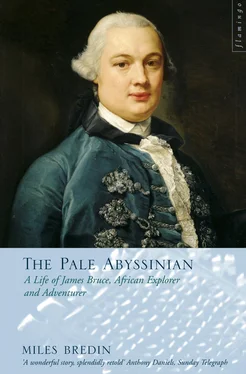Nothing could be more agreeable to me than that sight, and the reasoning upon it. I already, with pleasure, anticipated the time in which I should be a spectator first, afterwards an historian, of this phenomenon, hitherto a mystery through all ages. I exulted in the measures I had taken, which I flattered myself, for having been digested with greater consideration than those adopted by others, would secure me from the melancholy catastrophes that had terminated those hitherto unsuccessful attempts.
He first must needs make friends with the rulers of Egypt – the Mamelukes. Egypt was nominally ruled by the Turks but, under the recent onslaught of Catherine the Great, and after centuries of decadent rule, the Ottoman Empire was slowly crumbling. The Mamelukes were originally installed as a slave caste by rulers too lazy to govern themselves and as such had fought nobly against the crusaders and their descendants, but they had enjoyed greater and greater autonomy over the previous centuries. Indeed, Ali Bey, the present ruler, would declare himself an independent sultan the following year. Bruce was to be disappointed in the Mamelukes: ‘A more brutal, unjust, tyrannical, oppressive, avaricious set of infernal miscreants there is not on earth, than are the members of the government of Cairo.’
On 20 June 1768, after a five-day voyage, he made his first acquaintance with the Nile. At the mouth of the delta, by the ancient port of Alexandria, he was initially impressed by the near legendary city: ‘It is in this point of view the town appears most to advantage. The mixture of old monuments, such as the columns of Pompey, with the high Moorish towers and steeples, raise our expectations of the consequence of the ruins we are to find.’
To a man who had devoted so much of his life to learning about ancient civilizations, this must indeed have been a wonderful sight. He was at last seeing the things that he had heard and read described so many times by the ancients. Warming to his task, he surveyed the old port and gazed at the magnificent ruins. It was not long, however, before he resumed his customary sang-froid. Before he had even set foot on Egyptian soil, Alexandria had disappointed him.
But the moment we are in the port the illusion ends, and we distinguish the immense Herculean works of ancient times, now few in number, from the ill-imagined, ill-constructed, and imperfect buildings, of the several barbarous masters of Alexandria in the later ages … There is nothing beautiful or pleasant in the present Alexandria, but a handsome street of modern houses, where a very active and intelligent number of merchants live upon the miserable remnants of that trade, which made its glory in the first times.
Dressed as an Arab so as to be allowed where Europeans dared not tread, Bruce walked around the town, imbibing the atmosphere and providing inspiration for Richard Burton, who a century later would follow his example by donning Arab dress to visit Mecca and the Abyssinian Muslim stronghold of Harar. Despite being a very tall, red-haired man, Bruce managed, by wearing a turban and speaking perfect Arabic, to convince everyone that he was a peasant from the Barbary States. He was in good spirits. Two days before he arrived, an epidemic of the plague had petered out and, a few weeks earlier, Bruce’s astronomical instruments had been delivered. The Nile beckoned and at last he was able to respond: ‘Prepared now for any enterprise, I left with eagerness the thread bare enquiries into the meagre remains of this once famous capital of Egypt.’
With his entire band of servants dressed, like him, as Arabs, Bruce set off towards Rosetto on horseback – ‘We had all of us, pistols at our girdles’. Rosetto, midway between Alexandria and Cairo, was the embarkation point for travellers venturing up the Nile. The delta was dangerous and ‘besides, nobody wishes to be a partner for any time in a voyage with Egyptian sailors, if he can possibly avoid it’.
He arrived in Cairo on one of the Nile’s typical small sailing boats, a felucca, which were then known as canjas. Despite his appearance, he immediately set up house with a trader, M. Bertran, in the French quarter. By night he would dress as an English gentleman; by day he would venture, disguised, through the large gates which enclosed the foreign merchants’ street and patrol the bazaars of Cairo, buying manuscripts at Arabic prices and trying to find as much information about his route as was possible: ‘I never saw a place I liked worse, or which afforded less pleasure or instruction than Cairo’.
He did not have to stay in the source of his displeasure for very long, for yet again he was uncommonly lucky. The governance of Cairo lay all in the hands of one man, Ali Bey, whose closest confidant was an astrologer called Maalem Risk. The secretary of the Bey was ‘a man capable of the blackest designs’ but he was also most impressed by Bruce’s telescopes and quadrants. He passed Bruce’s baggage through customs, charging no duty, and introduced him to the Bey – ‘his turban, his girdle and the head of his dagger all covered with fine brilliants’.
Here Bruce’s expertise at dealing with Eastern rulers – learned at some risk in Algiers – came triumphantly into play. The correct amount of haughty arrogance combined with respect for the office and person of his host always seemed to come naturally to him. This and subsequent meetings allowed Bruce to make a few astrological predictions (something he did not believe in and usually disapproved of), and, by using Western medicine, to cure the Bey of a stomach upset, thus disposing the potentate towards him. Within a few weeks, he had been given his own house in the grounds of the seventh-century St George’s monastery outside the city and had been supplied with letters to the Naybe of Massawa, the King of Sennaar and the leaders of all the tribes he would encounter on his journey up the Nile. The Sardar of the Janissaries – chief of the mercenaries who policed the Turkish sultan’s vast empire – and the Greek Orthodox patriarch both gave him introductory letters also. It was a well-satisfied Bruce who cast off from Cairo on 12 December with his large retinue of servants and his friend Father Christopher, the former chaplain from Algiers, who had reappeared unexpectedly as an aide to Patriarch Mark of Alexandria.
Bruce had spent an unaccountably long time in Cairo considering he claimed to dislike it so. This goes unexplained in either his book, letters or journals. If he looked at the pyramids, he wastes less than a page on them in his book and feigns disinterest. They had, of course, been previously described by other travellers but even the most disenchanted tourist tends to write more than a postcard’s worth about them. His only comment in the Travels is that he thinks the stones for building them came from a more local source rather than the Libyan mountains, as was usually claimed. This is an odd omission and a mysterious, lost six months.
Bruce had rented himself a very beautiful felucca with ‘an agreeable dining room, twenty foot square’ for his cruise up the Nile. It did not quite rival that of the Ptolemies 2000 years earlier which boasted five restaurants, but it had an excellent captain, Abou Cuffi, who had been threatened with all sorts of horrors by the Bey if anything should happen to the good Hakim Yagoube (Doctor James). He had been made to leave one of his sons with the Bey ‘in security for his behaviour towards us’. Bruce’s successful treatment of the Bey had made him more ready to practise his medical skills and they became invaluable to him, not just for keeping himself and his servants healthy but also for gaining favours. He still acknowledged their value in his published thanks to Patrick Russel twenty years later – ‘My escaping the fever at Aleppo was not the only time in which I owed him [Russel] my life.’ From this point on, he always travelled as a doctor who practised for no payment – thus winning many friends – and in the words of the sultan’s firman as ‘a most noble Englishman and servant of the king’.
Читать дальше











